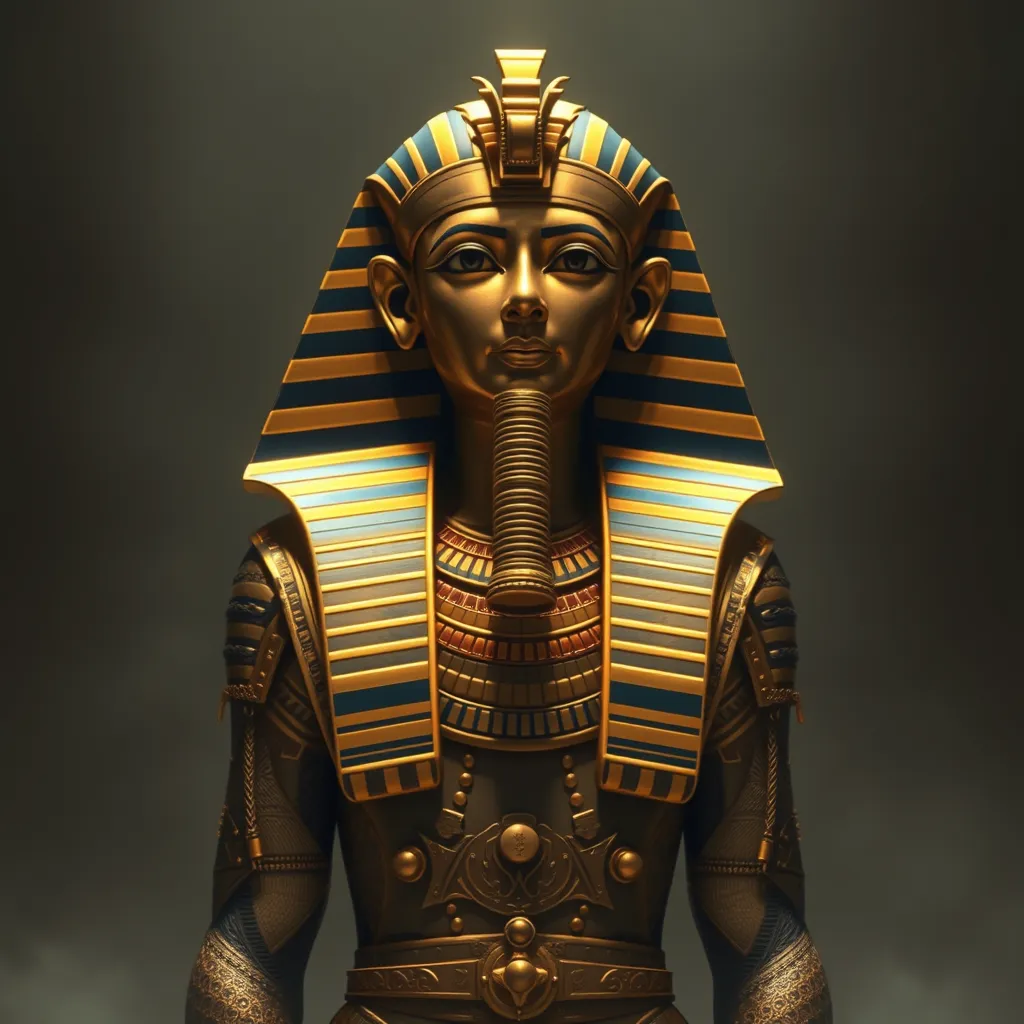The Divine Right of Kings: The Pharaoh as the Son of Ra and the Guardian of Egypt
I. Introduction
The concept of the Divine Right of Kings is one that asserts that a monarch derives the right to rule directly from the will of God. In ancient Egypt, this principle was vividly embodied in the figure of the Pharaoh, who was not only a political leader but also a divine figure. The Pharaoh was seen as the intermediary between the gods and the people, a role that was crucial in maintaining the social and political order of the time.
In ancient Egyptian society, the Pharaoh was central to both governance and religious practice, embodying the divine presence on earth. He was viewed as the Son of Ra, the sun god, which bestowed upon him a unique status that intertwined his kingship with the divine. Ra’s importance in Egyptian mythology cannot be overstated, as he was considered the creator of life and a symbol of light and truth.
II. The Concept of Divine Kingship
Divine kingship is a term that describes the belief that certain monarchs are divinely chosen and possess godly powers. This concept is not unique to Egypt; it has appeared in various forms across different cultures, including Mesopotamia, Japan, and Europe. In Egypt, the Pharaoh’s divine right was deeply rooted in their mythology and religious practices.
- Historical Context: The Pharaohs ruled for thousands of years, during which the concept of divine kingship evolved but remained central to their authority.
- Comparative Analysis: In contrast to divine rulers in other cultures, Egyptian Pharaohs were believed to be gods in human form, a belief that reinforced their absolute power.
- Social Order: The divine right of kings helped maintain a hierarchical society, where the Pharaoh’s authority was unquestioned and served to unify the people under a single ruler.
III. The Pharaoh as the Son of Ra
The title “Son of Ra” was one of the most significant aspects of the Pharaoh’s identity. This title not only underscored his divine lineage but also established his role as the earthly representative of the sun god.
The theological foundations of this relationship were complex, involving a range of rituals and beliefs that emphasized the Pharaoh’s connection to Ra. Various ceremonies, such as the coronation rites, were performed to legitimize the Pharaoh’s rule and affirm his role as Ra’s earthly embodiment.
IV. The Role of Ra in Egyptian Cosmology
Ra’s attributes in Egyptian mythology were numerous and powerful. He was associated with creation, light, and life, considered the protector of the pharaoh and the people.
- Attributes: Ra was depicted with the head of a falcon and a sun disk, symbolizing power and authority.
- Daily Journey: Ra’s journey across the sky each day was symbolic of the cyclical nature of life and death, reflecting the Pharaoh’s role in ensuring the continuation of Ma’at.
- Art and Architecture: Ra was commonly represented in temples and monuments, reinforcing his significance in daily life and governance.
V. The Pharaoh’s Responsibilities as Guardian of Egypt
The Pharaoh’s role as the guardian of Egypt encompassed various political, military, and religious duties, all tied to his divine authority.
- Political Duties: The Pharaoh was responsible for making laws, collecting taxes, and defending the kingdom against invaders.
- Military Leadership: As a divine ruler, the Pharaoh led his armies into battle, believed to have divine favor in warfare.
- Maintaining Ma’at: The Pharaoh’s primary duty was to uphold Ma’at, the cosmic order that ensured stability and harmony in society.
- Religious Duties: The Pharaoh performed rituals to appease the gods, ensuring the favor of Ra and other deities.
VI. The Pharaoh’s Image and Propaganda
The portrayal of the Pharaoh in art and literature was a crucial aspect of reinforcing his divine status. Monumental architecture, such as temples and pyramids, served not only as tombs but as symbols of the Pharaoh’s eternal power and connection to the divine.
- Artistic Representation: Pharaohs were often depicted in a larger-than-life manner, emphasizing their divine attributes and authority.
- Inscriptions: Hieroglyphics were used to document the Pharaoh’s achievements and divine lineage, creating a narrative of divine kingship.
- Public Perception: This use of propaganda helped foster loyalty and devotion among the populace, reinforcing the Pharaoh’s unassailable position.
VII. The Decline of the Divine Right of Kings in Egypt
Despite the long-standing tradition of divine kingship, the power of the Pharaoh began to decline due to various historical events and changes within Egyptian society.
- Historical Events: Invasions, such as those by the Hyksos and later foreign powers, challenged the authority of the Pharaoh.
- Alternative Structures: The rise of local leaders and priests began to erode the central power of the Pharaoh, leading to a more fragmented political landscape.
- Religious Movements: The emergence of new religious ideas and cults shifted focus away from the Pharaoh as the sole divine ruler.
VIII. Conclusion
In summary, the Pharaoh’s role as the Son of Ra and guardian of Egypt was foundational to the social, political, and religious order of ancient Egyptian civilization. This divine kingship not only legitimized the Pharaoh’s rule but also intertwined governance with religious belief.
Reflecting on the legacy of divine kingship, we see its influence in modern contexts where the interplay between religion and politics remains significant. The story of the Pharaohs serves as a reminder of how the divine right of kings shaped societies and how such beliefs can endure or evolve over time.
Ultimately, the legacy of the Pharaohs and their connection to Ra exemplifies the intricate relationship between religion and governance that has characterized many ancient civilizations.




